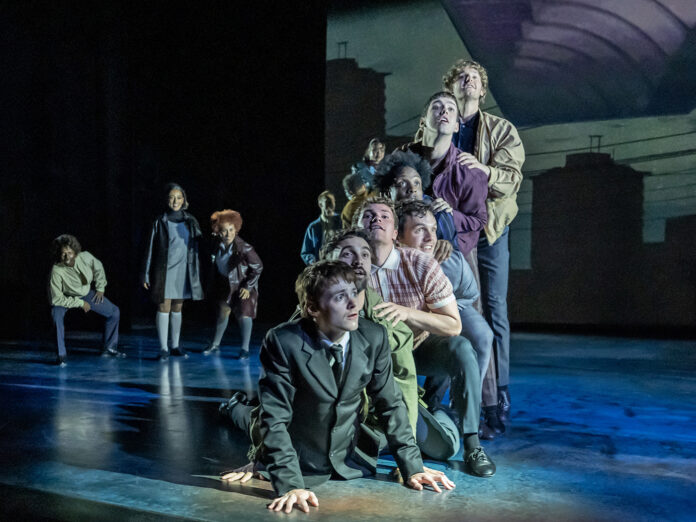Pete Townshend’s major rock operas – Tommy, Lifehouse and Quadrophenia – are a personal legacy he continues to wrestle with, repeatedly reviving and retranslating them into new forms. Quadrophenia (1973) was his attempt to remind The Who of their youthful Mod roots, and the music which lured him back to the band for 1996 performances of the album. After the 1979 film fleshed out and supplanted his liner note narrative, his wife Rachel Fuller’s orchestral arrangements for Quadrophenia Classical (2015) reconfigured the music. That recording, with additional soloists replacing vocals, soundtracks Quadrophenia: A Mod Ballet. The title will provoke derision from Who fundamentalists, suspicious of Townshend’s sometimes overreaching penchant for high-art versions of his classic music. Working with his blessing and light touch consultation, though, this Sadler’s Wells production revives Quadrophenia’s fervid, youthful essence.
Pete Townshend’s major rock operas – Tommy, Lifehouse and Quadrophenia – are a personal legacy he continues to wrestle with, repeatedly reviving and retranslating them into new forms. Quadrophenia (1973) was his attempt to remind The Who of their youthful Mod roots, and the music which lured him back to the band for 1996 performances of the album. After the 1979 film fleshed out and supplanted his liner note narrative, his wife Rachel Fuller’s orchestral arrangements for Quadrophenia Classical (2015) reconfigured the music. That recording, with additional soloists replacing vocals, soundtracks Quadrophenia: A Mod Ballet. The title will provoke derision from Who fundamentalists, suspicious of Townshend’s sometimes overreaching penchant for high-art versions of his classic music. Working with his blessing and light touch consultation, though, this Sadler’s Wells production revives Quadrophenia’s fervid, youthful essence.
A prologue sees Jimmy (Paris Fitzpatrick) poised on a jutting rock over stormy back-projected waves and the equally tempestuous, crashing brass of “I Am The Sea”. Four Mods emerge behind him to represent his four psychological sides, a narrative element likely lost on newcomers to Townshend’s story.
Act One then reverts to Jimmy’s London life, from office drone frustration to his idolatry of rock star the Godfather (Jack Widdowson), introduced with “My Generation”’s original violent guitar chords of as he rips open his Union Jack jacket. His tossing of Jimmy’s My Generation album in the Stage Door gutter is the first of several grim disillusions. Jimmy’s solo dance acts as a physical soliloquy in response, green parka trailing raggedly behind him, no match for the dazzling grace of his other hero the Ace Face (Dan Baines, looking more like Trainspotting’s cocky blond Jonny Lee Miller than Sting).
Director Rob Ashford and choreographer Paul Roberts ignore the cinema interpretation of the album’s story in these London scenes. Townshend’s concern with his parents’ war-traumatised generation and their impact on his own is movingly dramatised in Jimmy’s parents’ suburban home life. Mother (Kate Tydman) rouses from depressed sofa slumber to engage Father (Stuart Neal) in a desperate, half-violent erotic dance to “Love Reign O’er Me”, before slumping back to Valium and TV as Jimmy enters, ignorant of their roiling inner lives. Inter-generational anger simmers when he joins his dad in deadening factory work, explained by a flashback to Father surviving his friends’ wartime massacre on another coastal rock, the score dropping to hear their last gasps. A Soho café sanctuary and the exhilaration of Jimmy and the coveted Mod Girl’s rock club dance to “Can’t Explain”, pushing themselves to the limit as Yazz Ahmed’s Milesian trumpet gives the song a new, hip twist, counter these inherited horrors.
Act Two sends Jimmy to Brighton, where day-tripping Mods terrify packed commuter carriages to “5.15”, and he floats skyward amid swirling visions of pills and dream girls. A thrilling Mods and Rockers battle royal contrasts with Jimmy’s beach reunion with his family, a tantalising moment of happy unity with his childhood self. It all leads back to that jutting rock, though, where the crisis which sent Phil Daniels’ Jimmy’s scooter hurtling over a cliff is reached. The ocean churns under cosmic black sky, and Fitzpatrick’s acting matches his dancing as Jimmy shudders through his dark night of the teenage soul, finally achieving shattered transcendence as “Love Reign O’er Me” hits Gotterdammerung orchestral heights harder than any power chord. Alongside the young cast’s exuberant dancing and brightly coloured Paul Smith fashion, this ending’s hard-won optimism should speak to any new, young audiences who may be lured to Sadler’s Wells, giving The Who a fresh generation of fans.



